
SMEG Customer Case Study
Download this data sheet to explore the features and benefits of Naveo Commerce for Enterprise Grocery.
After Brexit, the Climate Emergency will be top of the UK Government’s agenda. But, what can retailers do to make a difference – before it’s too late?
After Brexit, the Climate Emergency will be top of the UK Government’s agenda. But, what can retailers do to make a difference before it’s too late? In this article we outline the practical steps you can make today, for a greener future tomorrow.
Thanks to increased media coverage of the Extinction Rebellion, teenage media activist Greta Thunberg and a more informed younger generation Y, increased scrutiny is being placed on pollution, the role of plastics and on businesses generally to operate more sustainably.
The reality of Global Warming has hit home over the last few months – with numerous floods across the UK, the sweeping Bushfires in Australia and the drastic shift in seasonal weather across Europe. Despite years of Scientific Research warning of the impact of Global Warming – it’s clear the climate crisis won’t just affect the next generation – these devastating affects are happening now.

After Brexit, the Climate Emergency will be top of the UK Government’s agenda. But, what can retailers do to make a difference?
Click on our list of practical steps you can make today, for a greener future tomorrow:
It’s vital to balance sustainability without taking a hit on your overall growth and profitability. After all, there’s little evidence to suggest that consumers are willing to pay more for products in order to mitigate change.
For thriving businesses, the focus has always been an obsession with giving customers what they want, and that remains the same today. However what they want may be changing, and soon.
We are more aware than ever, that the impact of our everyday choices are having an impact on the future of our planet. Whilst evidence suggests that consumers aren’t willing to pay more for a product based on sustainability. The good news is that there are increasing signs that the public is ready to act in other ways. Whether that’s cutting down on meat, travel or buying less plastic.
Consumer habits may be shifting – we predict that more and more consumers will be willing to accept a free “green” delivery slot that takes a day or two longer to arrive – Forsaking convenience for the sake of the planet.
According to the Guardian, as many as four in five Britons said they are likely to take one of a number of actions this year to reduce their carbon footprint. More than two-thirds (68%) said they were likely to use energy-efficient products or utility providers and 79% of people said they were likely to recycle more. What’s more, “63% of consumers would shop using a brand if it was found to be detrimental to the environment” (InRiver).
Online sales are increasing year-on-year and show no signs of slowing down. From a retailer’s perspective, delivery is often the largest contributor to their carbon emissions. With more and more packages to deliver every year. What can retailers do?
FACT: Zalando claim that 60% of its emissions come from outbound logistics.
The option to deliver multiple packages in one delivery is becoming increasingly popular with eco-conscious consumers. Not only does it reduce packaging waste, but it reduces the carbon footprint from carriers. Why not make this option the default on checkout? By making it clear which delivery option is the ‘green’ choice – Consumers can then weigh up convenience vs. carbon impact for themselves.
Amazon have started to include an “Amazon Day” option on check-out. Prime members can pick a day of the week that’s convenient to have all their orders delivered in one go.
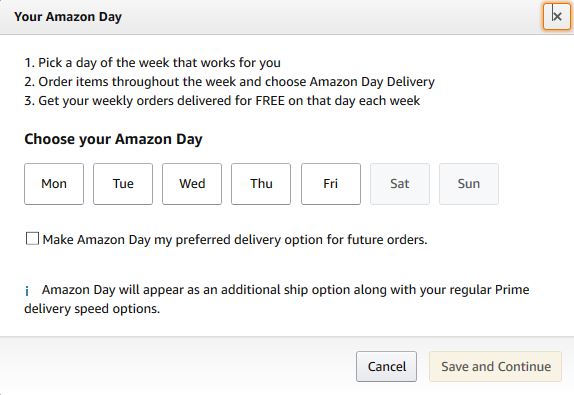
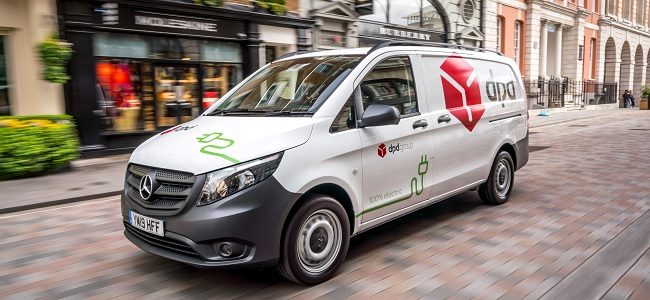
Every time a parcel is delivered the customer gets notified that their parcel was delivered by an electric vehicle.
As part of their sustainability strategy, IKEA plans to fully decarbonise its delivery fleet in New York, Los Angeles, Paris, Amsterdam, and Shanghai by 2025. In Shanghai, they hit their goal early.
Shanghai is one of the biggest cities in the world, and as such struggles with air pollution more than any other on their list – IKEA decided hit the nail on the head and tackle this city first. Today, all IKEA home deliveries in Shanghai are now carried out by electric vehicles. To achieve this goal, IKEA partnered with a local companies to source the vehicles and get the charging infrastructure in place to make it possible.
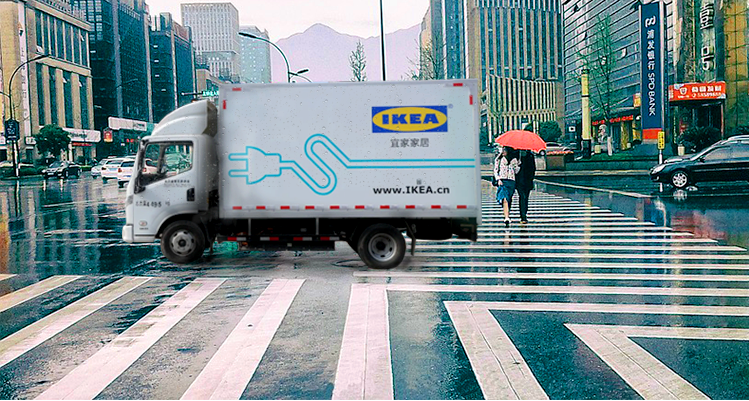
This is a great example of a organisation leading the way in sustainability. They are not alone: with major delivery carriers such as UPS and FedEx working on making the shift to low-emission fleets.
There are plenty of quick-wins you can tackle without the need to resort to dramatic and costly innovations.
What’s more, returned goods may not be able to be resold at full-price, and in some instances they be destoyed. Adding more pollution to the equation when you consider the energy needed to manufacture said products in the first place.
The Co-op are exploring a number of different home delivery schemes, one of which is online deliveries via their dedicated website, orders will initially be delivered using zero-emission electric cargo bikes.
The Co-op aims to make ordering food online as convenient as ordering a take-away – with deliveries in as little as two hours from placing an order. The Co-op’s new online service and eCommerce operations run on Naveo’s Headless Connected Commerce platform – enabling super-fast home deliveries.
“Convenience lies at the heart of our offering and as part of this, we have major online expansion plans which will make it easier than ever for customers to shop with us,” comments Chris Conway, Head of Food Digital at The Co-op. “Such growth can only be facilitated with a digital partner that offers modern and agile technology and we’re delighted to continue our work with the Naveo team who are intrinsic in bringing these plans to life.”
The Co-op plans to expand their offering to 650 branches by the end of the year.
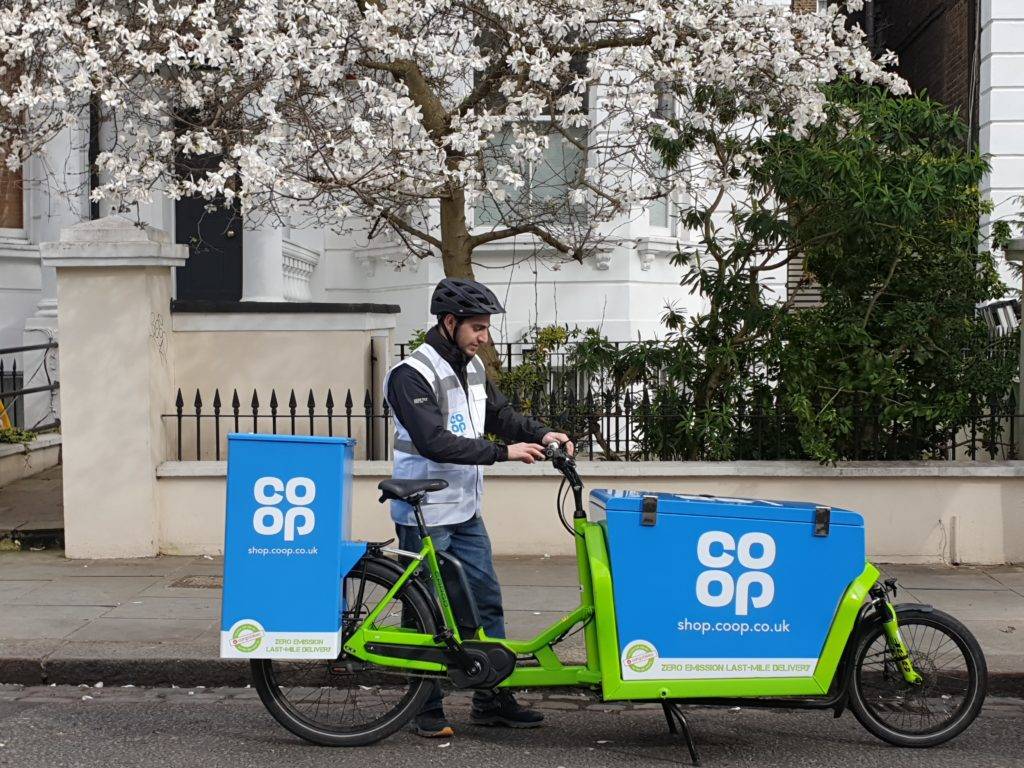
Businesses could take a leaf out of The Co-op’s book by adopting a decentralised warehouse /in-store picking business model for eCommerce.
The last-mile tends to be the most resource-intensive part of the post-purchase supply chain, as carriers need to make individual journeys to addresses – rather than pallet loads of product to one destination. By using stores (or partering with non-competitive retailers) you can bring products closer to the customer. Using local micro-fulfilment centres will allow more deliveries to be made by sustainable methods such as cargo bikes or electric vehicles.
We predict that there will be a rise in “Recycled Commerce”. In fact, the second-hand online market place has never been bigger. In September 2019, tens of thousands of people took Oxfam’s #SecondHandSeptember pledge not to buy new clothes for a month, saving carbon equivalent to driving round the world 200 times.
More people are shopping second-hand than ever before – with “a third of consumers buying more second-hand items than they were 12 months ago and more women are happy to rummage through vintage or used items than men.” Marketing Week
Fuelled by the desire to bag a bargain and reduce carbon footprints – Thredup claims that the total second-hand apparel market is set to double in 5 years. According to their 2018 Thift Report, resale is growing 24x faster than retail – with the resale sector driving growth from key disruptors such as ThredUp, TheRealReal and Poshmark.
Whilst choice and convenience are major factors when shopping online – retailers should focus on consumer’s ‘hate to waste’ mentality – making the environmental impact of their products clearly visible to the consumer. This could be information that highlights: Where a product was sourced, durability and estimated lifespan, whether sustainable fabrics and materials were used in the product manufacturing, and indeed whether the packaging is recycled or organic. I can see a time in the not too distant future where many brands have a traffic light system, highlighting the estimated savings in CO2, electricity and water compared to alternatives.
If you’re able to sell on goods that have been returned without losing quality, then jump on the ‘resale’ bandwagon. You will, of course, need to weigh up the cost of refurbishment and resale versus the cost to buy new.
It’s a well known-fact that returns in the fashion industry can be as high as 40%. Customers returning goods to retailers contribute to the overall carbon footprint and waste. The most effective way to stamp out the problem is to address the issue at the heart of the problem. According to a recent survey by Klarna, 27% of returns are because the fit isn’t right. Whilst another 19% return items because the product looks different in the flesh, compared with online. This highlights the importance of size guides and accurate product information.
ASOS, M&S and Zalando are among a number of retailers using smarter fit technology online. ASOS are well known for embracing new online features. The latest of which is an augmented reality tool which allows you to see how the garment would look on your figure – with 16 different body types and heights to choose from.
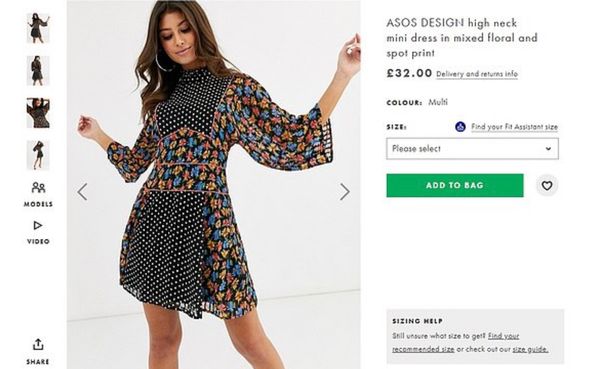
What’s more, some retailers have ended free returns completely – others are experimenting with making serial returners pay for their returns.
With sustainability becoming an ever more prevalent factor in a company’s strategic mission, its key that companies need to address areas where they can feasibly make changes that have a positive impact on the wider environment from a paperless warehouse, recycled or organic packaging to efficient logistics and electric vehicles.
This eDelivery report will look at delivery emissions and plastic waste and what retailers in in the UK and Europe can do to reduce them.
This report will focus on the post-purchase part of retail:
Download your copy of the report here.

Download this data sheet to explore the features and benefits of Naveo Commerce for Enterprise Grocery.

As Naveo Commerce plans its exciting launch of Scan & Go supermarket technology, we look at the key differences between this and self-checkout services already offered in most grocery stores.

As Naveo Commerce plans its exciting launch of Scan & Go supermarket technology, we look at the key differences between this and self-checkout services already offered in most grocery stores.